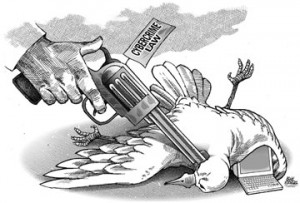Cybercrime law violates freedom of expression

Among the first victims of Martial Law was the freedom of expression.
Twenty-six years after the end of this malignant era, we should be celebrating a priceless gift of liberty.
However, last Sept. 12, the present occupant of Malacañang signed into law something that brings to life the ghost of Martial Law — the draconian Cybercrime Prevention Law or Republic Act 10175.
The authors and supporters of this law claim that the law is needed to regulate how people behave in cyberspace.
Rapid technology advancement has revolutionized how people share ideas on line, especially through social media. The power of the Internet helped topple dictators in the Middle East and North Africa last year.
Article continues after this advertisementIn the Philippines, with Internet penetration at 30 million or about 30 percent of the population, on line and social media has become a potent force.
Article continues after this advertisementIncluding online libel for defamatory utterances and publications sets back the campaign to strike out the 80-year-old criminal penalties for libel under the Revised Penal Code.
Punishing online libel a degree higher than ordinary libel is grievous aggravation.
Libel has been used as a harassment tool by public officials against journalists and citizens who criticize the excesses and misconduct of those in power.
Worse, the new law has a “take down” provision which would give the executive department through the Department of Justice powers to issue an order to “restrict or block access” to computer data considered as “prima facie” evidence in violation of the law’s provisions.
The inclusion of libel and the “take down” provisions of the Cybercrime Prevention Law strikes at the heart of the constitutionally protected freedom of expression.
This right of a free press prohibits the State from using its powers to make good threats of subsequent punishment or censorship of published or uttered ideas from any citizen.
Article 3, sec. 4 of the 1987 Constitution clearly states that “No law shall be passed abridging the freedom of speech, of expression, or of the press, or the right of the people to assemble and petition the government for redress of grievances.”
On this day of remembrance, the call for vigilance against enemies of freedom and democracy gains more relevance.
If some quarters in high government want to police cyberspace because it views it as the new wild wild west, then it falls on all freedom-loving Filipinos, especially journalists, bloggers, and millions of online social media users to band together as cyber cowboys, ready to lasso the wayward sheriff.